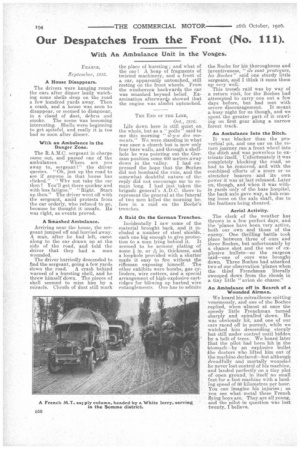Our Despatches from the Front (No. 111),
Page 22

If you've noticed an error in this article please click here to report it so we can fix it.
With An Ambulance Unit in the Vosges.
FRANCE,
September, 1916.
A House Disappears.
The drivers were hanging round the cars after dinner lazily watching some shells drop on the road a few hundred yards away. Then a crash, and a house was seen to disappear, or seemed to disappear, in a cloud of dust, debris and smoke. The scene was becoming interesting. Shells were beginning to get spiteful, and really it is to bad so soon after dinner.
With an Ambulance in the Danger Zone.
The R.A.M.Q. sergeant in charge came out, and passed one of the ambulances. " Whert, are you away to, sergeant?' the driver queries. " Oh, just up the road to see if anyone in that house has clicked." "Why not take the car then ? You'll get there quicker and with less fatigue." " Right. Start up then." The driver went off with the sergeant. amid protests from the car orderly, who refused to go, because he thought it unsafe. He was right, as events proved.
A Smashed Ambulance.
Arriving near the house, the sergeant jumped off and hurried away. A man, after he had left, came along to the car drawn up at the side of the road, and told the driver that they had a man wounded.
The driver hurriedly descended to find the sergeant, going a few yards down the road. A crash behind warned of a bursting shell, and he threw himself down. The pieces of shell seemed to miss him by a miracle. Clouds of dust still mark the place of bursting ; and what of the car? A heap of fragments of twisted machinery, and a front of a, car, apparently untouched, still resting on the front wheels. From the windscreen backwards the car was smashed beyond belief. Examination afterwarcks showed that the engine was almost untouched.
THE END OF THE LINE, Oct., 1916. Life down here is still quiet on the whole, but as a " poilu " said to me this morning "17-y-a des moments." We were Standing in what was once a church but is now only four bare walls, and through a shellhole he was pointing out the German position some 600 metres away down in the valley. I had expressed the hope that the Roches did not bombard the ruin, and the somewhat doubtful nature of the reply did not encourage me to remain long. I had just taken the brigade general's A.D.C. there to represent the general at the funeral of two men killed the morning before in a raid on the Boche's trenches.
A Raid On the German Trenches.
Incidentally I saw some of the material brought back, and it included a number of steel shields, _ each one big enough to give protection to a man lying behind it. It seemed to be armour plating of some i in. or *, in. thickness, and a loophole provided with a shutter made it easy to fire without the rifleman exposing himself. The other exhibits were bombs, gas cylinders, wire cutters, and a special arrangement of high-explosive cartridges for blbwing up barbed wire entanglements. One has to admire
the Beebe for his thoroughness and inventiveness, "i/s sont pratiques, les Boches" said one sturdy little sergeant, and I think it sums them up very well. This trench raid was by way of a return visit, for the Boches had attempted to carry one out a few days before, but had met with severe discouragement. It meant a busy night for us thoughl and we spent the greater part of it crawling on first gear along a narrow forest track.
An Ambulance Into the Ditch.
It was blacker than the proverbial pit, and one car on the return journey ran a front wheel into the ditch and was powerless to extricate itself. Unfortunately it was completely blocking the road, so had to be removed, and with the combined efforts of a score or so stretcher bearers and its own power it was at last released. Later on, though, and when it was within yards only of the base hospital, the back axle gave way, a hub coming loose on the axle shaft, due to the feathersbeing sheared.
Aerial Activity.
The clerk of the weather has thrown in a few perfect days, and the 'planes have been very active, both our own and those of the enemy. One thrilling battle took place between three of ours and three Boches, but unfortunately by a chance shot and the use of explosive bullets—so the surgeon said—one of ours was brought down. Three Boches had attacked two of our observation 'planes when the third Frenchman literally swooped down from the clouds in a tiny little " avion de chasse."
An Ambulance off in Search of a Wounded Airman.
We heard his mitrailleuse spitting venemously, and one of the Boches replied, when -almost at once the speedy little Frenchman turned sharply and spiralled down. He was obviously hit, and one of our cars raced off hi pursuit, while we watched him descending steeply but still under control until hidden
a belt of trees. We heard later that the pilot had been hit in the iitomach—by an explosive bullet the doctors who lifted him out Of the machine declared—but although dreadfully and mortally wounded he never lost control of his machine, and landed perfectly on a tiny plot of open ground, in itself no small feat for a fast machine with a landing speed of 80 kilometres per hour. You can imagine his injuries ; so you see what metal these French flying boys are. They are all young, and the pilot in question was -lust twenty, I believe.
























